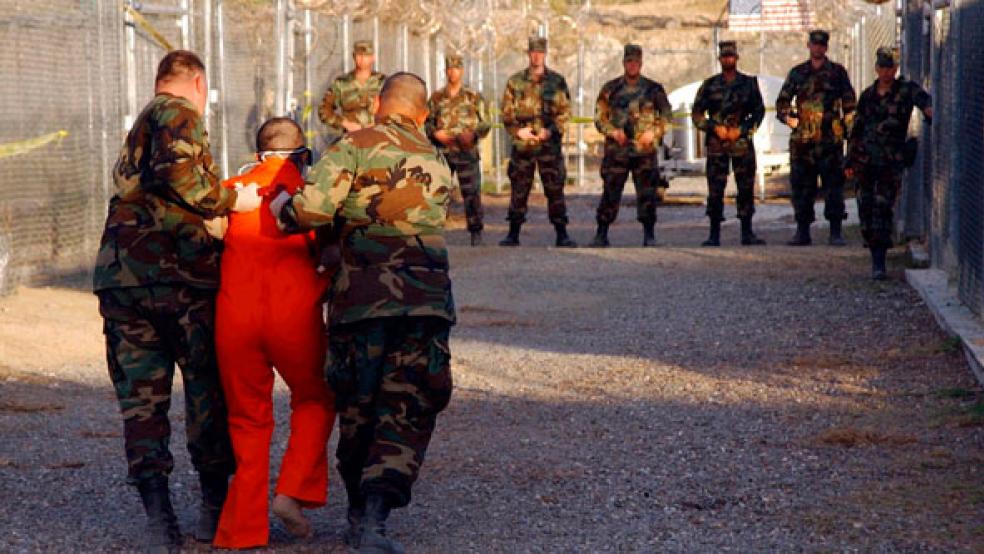The Obama Administration is struggling to find a cost effective way to shift Guantanamo Bay detainees to prisons on the U.S. mainland. Meanwhile, Puerto Rico is struggling through an unprecedented fiscal and economic crisis. These two problems could create a unique policy opportunity: to save federal taxpayer dollars and boost the Puerto Rican economy, move the detainees to the Commonwealth rather than to the mainland U.S.
At his year-end press conference, President Obama continued to advance the fiscal case for shutting down the Guantanamo detention camp. In answer to a reporter’s question, President Obama said, “I think we can make a very strong argument that it doesn’t make sense for us to be spending an extra $100 million, $200 million, $300 million, $500 million, a billion dollars, to have a secure setting for 50, 60, 70 people. And we will wait until Congress has definitively said no to a well-thought-out plan with numbers attached to it before we say anything definitive about my executive authority here.”
Currently, the federal government spends about $400 million annually to house Gitmo’s 107 detainees – a cost of almost $4 million per inmate. A recently rejected Pentagon plan to relocate the prisoners would have cost up to $600 million one-time and then somewhat less than $300 million annually.
Related: U.S. Budget Deal Could Complicate Plans to Close Guantanamo
Given Puerto Rico’s lower salaries, it should be possible to keep the inmates there for considerably less. Transporting them should also be relatively simple: Puerto Rico is just 600 miles by ship from Guantanamo.
Further the Puerto Rico prison system has room for these detainees. According to the U.S. Bureau of Justice Statistics, Puerto Rico had a total prison population of 12,327 and a capacity of 13,832, at the end of 2014. Puerto Rico’s declining population has been associated with a reduction in the number of individuals in detention: prison headcount has fallen 16 percent since 2000.
Puerto Rico’s declining population has also been associated with a weak economy and an unsustainable debt burden. Total public sector debt is over 100 percent of Gross National Product, and the government started to selectively default on debt service payments in August. Although Congress did not provide assistance to Puerto Rico in the recent $1.2 trillion Omnibus bill, speaker Ryan has committed to passing legislation to help the Commonwealth by the end of March.
If the Pentagon and the Commonwealth could come up with a plan to house Guantanamo detainees in Puerto Rico for $200 million annually, federal taxpayers would save money while adding 0.3 percent to Puerto Rico’s GNP. For an economy that contracted 0.9 percent in 2014, that would be a welcome shot in the arm.Diplomatically, relocating detainees from Guantanamo would remove a point of contention with the Cuban regime, which wants to reclaim the territory occupied by the base. Although conservatives may not be anxious to accommodate the Castro's, it is worth considering that a more democratic post-Castro government might also regard the U.S. lease of Guantanamo as a colonial leftover and an affront to national sovereignty.
Related: Pentagon to List Alternative U.S. Sites to Guantanamo Prison
From a legal standpoint, relocating detainees from Guantanamo to Puerto Rico may be an attractive compromise. The architects of the Guantanamo detention facility believed that the base’s non-U.S. location would provide authorities greater flexibility to hold and interrogate suspected terrorists. Subsequently, the Supreme Court constrained this flexibility, finding that Guantanamo detainees had a right to habeas corpus in Boumediene v. Bush (2008).
To the extent that the territorial issue still matters, it is worth noting that the Constitution and Bill of Rights only apply to Puerto Rico at the pleasure of Congress. The so-called territorial clause of the Constitution gives Congress the “power to make all needful Rules and Regulations respecting the Territory or other Property” of the United States. As recently as 1993, an appellate court found that this clause still applied to Puerto Rico. It thus may be possible for Congress to create an enemy combatant detention system in Puerto Rico not fully subject to the Bill of Rights.
Puerto Rico has room to house remaining Guantanamo detainees, offers greater legal flexibility than U.S. states and could use a fiscal stimulus. Perhaps it is the place where Congress and the Administration can find common ground on detaining enemy combatants.






